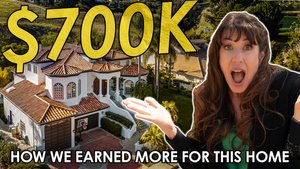Selling a Home with a Mortgage in Orange County: What to Expect
If you’re planning to sell your home in Orange County, and you still have an active mortgage, you might be wondering how it will affect the sale process. The good news is that selling a home with a mortgage is common, and the process is relatively straightforward — as long as you know what to expect.
At The Monica Carr Real Estate Group, we’ve guided countless homeowners through the process of selling their homes while still paying off a mortgage. This guide will walk you through everything you need to know, from understanding your mortgage balance to navigating closing costs and ensuring a smooth, stress-free transaction.
Can You Sell a Home with an Existing Mortgage?
Yes, you can absolutely sell a home with a mortgage. In fact, the majority of homeowners still have an active mortgage at the time of sale. When you sell, the proceeds from the sale are used to pay off your mortgage balance, and any remaining funds (known as your net proceeds) go to you.
The key is ensuring that the home’s sale price is higher than the balance you owe. If the sale price is lower than your mortgage balance, you may need to consider a short sale, which comes with its own set of challenges.
Key Steps to Selling a Home with a Mortgage
If you’re selling a home with a mortgage in Orange County, here’s a step-by-step overview of what to expect during the process.
Step 1: Determine Your Mortgage Payoff Amount
The first step is to find out how much you still owe on your mortgage. Contact your lender and request a payoff statement, which will tell you the exact amount required to fully pay off the loan.
This statement includes:
Outstanding Balance: The total amount left to pay on your mortgage.
Accrued Interest: Since interest accrues daily, the payoff amount may be slightly higher than your most recent loan statement.
Prepayment Penalties: Some mortgages include prepayment fees if you pay off the loan early, though these are less common today.
Pro Tip: Request a payoff statement closer to your expected closing date, as the amount will change daily as interest accrues.
Step 2: Calculate Your Home’s Market Value
Before you list your home for sale, it’s crucial to determine its market value. This will help you understand whether the potential sale price will cover your mortgage payoff amount and other costs associated with selling.
To determine your home’s value, you can:
Request a Comparative Market Analysis (CMA) from a local real estate agent. This will give you insight into recent sales of similar homes in your area.
Schedule a Professional Appraisal for a precise, unbiased valuation of your property.
Use Online Tools, but remember that automated estimates (like Zestimates) aren’t always accurate.
Example: If you owe $800,000 on your mortgage, but your home is valued at $1.2 million, you’ll have about $400,000 in potential proceeds (minus closing costs and fees).
Step 3: List the Property and Attract Buyers
Once you’ve confirmed your home’s value and mortgage balance, it’s time to list your property. When you work with The Monica Carr Real Estate Group, we handle every aspect of the listing process, from professional photography to marketing and buyer outreach.
Here’s what you can expect:
Staging and Presentation: We’ll help you stage your home to appeal to the largest pool of buyers. Homes that look modern, fresh, and clean tend to sell faster and for higher prices.
Online Marketing: We market your home through multiple channels, including MLS listings, social media, and targeted advertising.
Open Houses and Showings: We’ll coordinate private showings and open houses to get your home in front of qualified buyers.
Pro Tip: Pricing your home accurately is critical. Overpricing can cause your home to sit on the market, while underpricing may leave money on the table. The Monica Carr Real Estate Group can help you find the sweet spot.
Step 4: Accept an Offer and Open Escrow
Once you receive an offer and accept it, the home sale process officially begins. At this stage, you’ll enter escrow, where a neutral third party holds funds and ensures all conditions of the sale are met before the transaction is complete.
Here’s what happens next:
Title Search: The escrow company conducts a title search to ensure no liens or claims exist against the property.
Mortgage Payoff: Your lender provides the exact payoff amount, which will be paid using the buyer’s funds at closing.
Buyer’s Contingencies: Buyers often have contingencies, such as inspections and appraisals, which must be cleared before moving forward.
If your home appraises for less than the purchase price, your agent may need to negotiate with the buyer to resolve the discrepancy.
Step 5: Close the Sale
Closing day is when the sale becomes final, and ownership of the home is legally transferred to the buyer. Here’s what you can expect on closing day:
Pay Off the Mortgage: The escrow company will send the payoff amount to your lender, which satisfies your mortgage debt.
Pay Closing Costs: You’ll pay closing costs, which typically include title fees, transfer taxes, and real estate agent commissions.
Receive Your Proceeds: Once all debts and fees are paid, you’ll receive the net proceeds from the sale.
Example of Sale Proceeds Breakdown
Sale Price: $1.2 million
Mortgage Payoff: $800,000
Closing Costs (6% for agent fees, taxes, etc.): $72,000
Net Proceeds: $328,000
Costs to Expect When Selling a Home with a Mortgage
Selling a home with a mortgage comes with additional costs. Here’s what you need to budget for:
Mortgage Payoff: The amount required to pay off your existing mortgage.
Real Estate Agent Commissions: Typically 5-6% of the home’s sale price, shared between the buyer’s and seller’s agents.
Closing Costs: Title fees, transfer taxes, escrow fees, and other closing-related expenses (typically 1% to 3% of the sale price).
Repairs and Staging: If you make repairs or stage your home, factor in those costs as well.
Prepayment Penalties: Check with your lender to see if your mortgage has any early payoff penalties.
What If You Owe More Than Your Home’s Value?
If your home is "underwater" (meaning you owe more on your mortgage than the home’s value), you may need to explore a short sale. In a short sale, you sell the home for less than the amount owed, and the lender agrees to accept the reduced payoff.
Why Consider a Short Sale?
It avoids foreclosure, which can have long-term negative effects on your credit.
You may be able to negotiate debt forgiveness for the balance.
How We Can Help: At The Monica Carr Real Estate Group, we have experience negotiating short sales with lenders to help sellers avoid foreclosure and move forward with confidence.
Why Work with The Monica Carr Real Estate Group?
Selling a home with a mortgage requires strategic planning, negotiation, and attention to detail. The Monica Carr Real Estate Group specializes in helping homeowners in Irvine and Orange County sell quickly, profitably, and with minimal stress.
Here’s how we help you succeed:
Market Expertise: We know how to price your home accurately and negotiate offers to maximize your profits.
Professional Marketing: Our listings stand out thanks to high-quality photography, online advertising, and open house events.
Negotiation Skills: We work tirelessly to get you the best price and terms for your sale.
Comprehensive Support: From pricing to closing, we handle every detail to make the process as smooth as possible.
Ready to Sell Your Home in Orange County?
If you’re ready to sell a home with a mortgage in Orange County, The Monica Carr Real Estate Group is here to help. Our experienced real estate agents will walk you through each step of the process, ensuring a smooth and successful sale.







